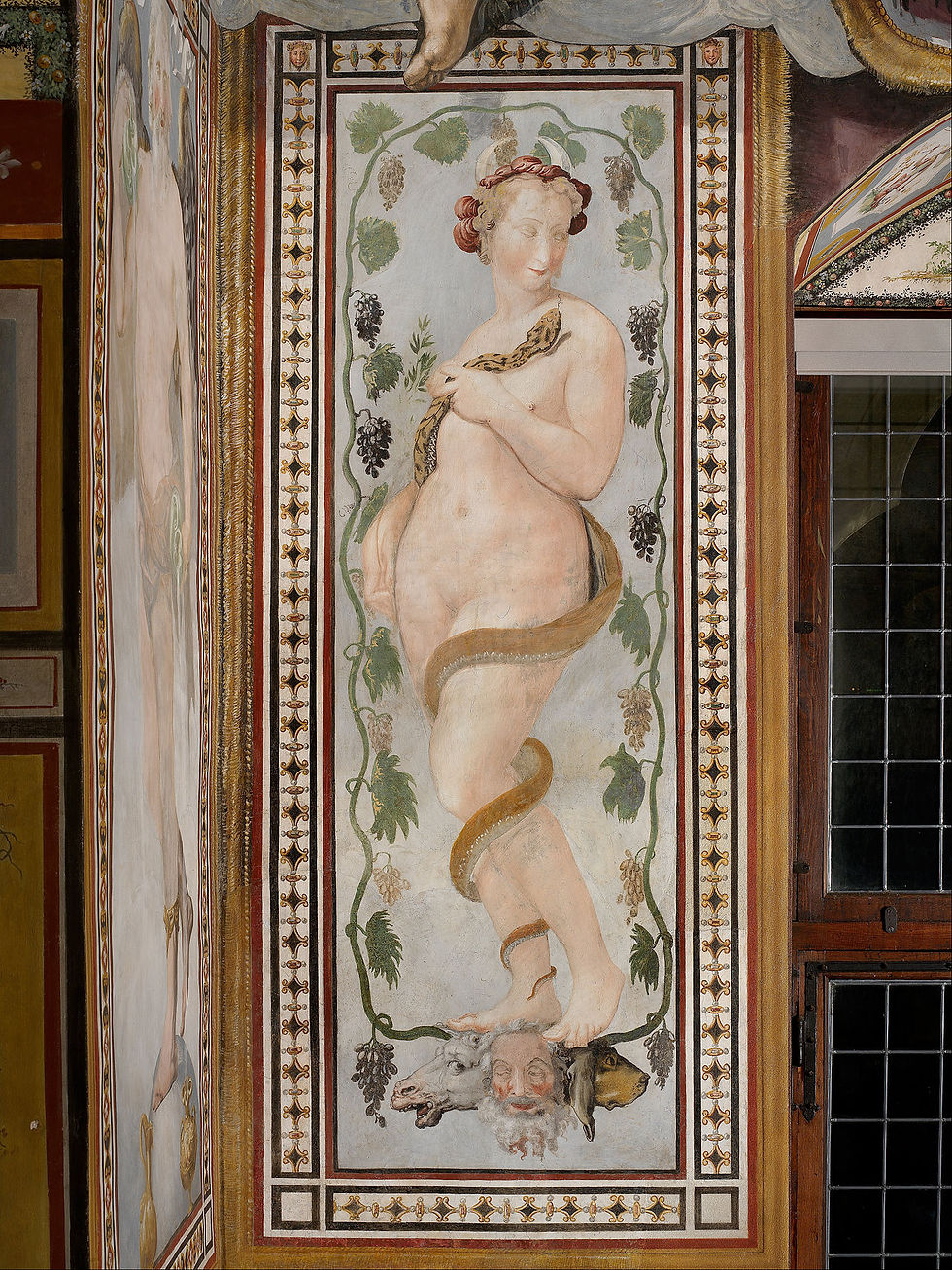
Of all the figures in classical mythology associated with witchcraft and magic, few are more revered today than Hecate, the ancient Greek goddess of sorcery and nighttime apparitions. With her ominous epithets as “Queen of Ghosts” and “Goddess of the Crossroads,” Hecate has emerged as an iconic patroness of witches and necromancy.
In the pantheon of Greek deities, Hecate had dominion over thresholds, doorways, night, and the realms of spirit. Her priestesses were said to employ plant medicines, spells, and prophecies to commune with the dead and divine the future.
Hecate was described as roaming roads at night accompanied by a pack of howling, spectral dogs. She was both venerated and feared as the protector of navigating liminal spaces.
Artistic depictions show her holding twin torches to guide the way, wearing a key she used to unlock the gates between worlds, and bearing a dagger for apotropaic magic. Poisonous plants like hemlock were her offerings.
As Greek culture was displaced by Christianity, Hecate became strongly identified with occultism and black magic in the shadowy pagan underside. Alongside harbingers like bats and owls, Hecate was the goddess of the “night-hag” archetype of frightening witch figures.
Today she thrives as a patroness of modern witchcraft and sorcery. Neopagans and Wiccans revere Hecate on November 16th, leaving meals for her at crossroads and holding nocturnal vigils during the moon’s peak. Seekers come to her for knowledge of magical herbs, communicating with spirits, and divine visions revealed only after nightfall.
Is Hecate the right deity for you?
Here are some signs that Hecate may be the right deity to connect with in your practice:
• You feel drawn to nighttime, shadows, crossroads, the Dark Moon, and liminal spaces. These are all associated with Hecate's domain.
• You have an interest in magic, spellwork, plant medicine, and working with spirits. Hecate rules over witchcraft and necromancy.
• You are seeking a patroness of witchcraft and sorcery specifically. Hecate is revered as a goddess of these arts.
• Your magical goals align with Hecate's expertise - divination, gaining occult knowledge, communicating with the dead, and soul work.
• You resonate with Hecate's symbols - torches, daggers, keys, poisons, dogs, and herbs like hemlock.
• You feel a strong connection when reading Hecate's myths and legends. Her story speaks to you.
• You have had visions or signs that remind you of Hecate - crossroads, barking dogs, full moons, etc.
• Working with Hecate feels aligned with your shadow work and internal transformations.
• You are looking for an ancient goddess rooted in Greek myth but relevant to modern practice.
• You are drawn to working with deities associated with the Moon, underworld, and night spirits.
Ultimately it comes down to your intuition. Notice if you feel energetically aligned with Hecate specifically. Seek signs and listen to inner guidance. With study and contemplation, you'll discern if she's meant to be your patroness.
Ways to honor Hecate
Here are some suggested ways to honor the goddess Hecate:
• Set up an altar with her sacred symbols - torches, labrys (double daggers), cauldrons, keys, crystals like onyx or hematite, plants like garlic and lavender. Change items based on the lunar cycle.
• Perform rituals on moonless nights and during the Dark Moon phase when her energy is considered strongest. Hold night vigils at crossroads.
• Light black or purple candles for her. Use a campfire or outdoor fire pit when possible. She is associated with torchlight.
• Leave offerings at three-way crossroads - food, candles, flowers, coins, etc. Especially do this on November 16th, which is dedicated to her.
• Invite her familiars like dogs, bats, owls, cats, snakes, frogs, and ravens into rituals by using their imagery.
• Chant her epithets - "Hecate Triformis," "Hecate Chthonia," “Queen of the Witches," and praising her wisdom and power.
• Take ritual baths with cleansing and purification herbs sacred to her - mugwort, plantain, yarrow, dandelions, garlic.
• Thank her for magical knowledge and guidance with spellcraft, divination, communing with spirits of the dead, and traveling between worlds.
• Observe the night sky and transition points between light/dark, like dusk and dawn, to honor her liminal nature.
• Perform rituals of shadow integration, as Hecate rules over the subconscious realm. Release what no longer serves you.
Hecate appreciates the effort made to understand the depths of the soul. She aids those traversing the crossroads of transformation.
When did Hecate first appear?
Hecate first appears in ancient Greek mythology and texts dating back to the 8th or 7th century BCE, though her origins may be earlier:
• One of the earliest known mentions of Hecate is in Homer's Theogony, written around 700 BCE. Here she is described as an ancient goddess with power over heaven, earth, and sea.
• In Hesiod's Theogony, composed around 700 BCE, Hecate is again referenced as a goddess with broad dominion along with her roles as overseer of the wilderness and protector of youth.
• Hecate was depicted on a number of ancient Greek vases dating from the 6th century BCE onwards. She is frequently shown holding torches and accompanied by dogs.
• The playwright Aeschylus, born 525 BCE, wrote of Hecate in works including The Persians. He emphasized her role as a goddess of the dark arts.
• In the Argonautica by Apollonius Rhodius from the 3rd century BCE, Hecate is invoked by the sorceress Medea for spells and potions.
• By the 5th century BCE, there were temples dedicated to Hecate in Athens. Public rituals took place under the new moon.
• In later myths like the Aeneid by Virgil, composed around 20 BCE, Hecate's underworld aspects and relationship to witchcraft became prominent.
So references to Hecate appear consistently across ancient Greek literature, myth, and art for over 500 years, highlighting her enduring importance as a mystical goddess tied to magic and the night. Her cult endured through the Hellenistic era into the early common era as well.
Comments